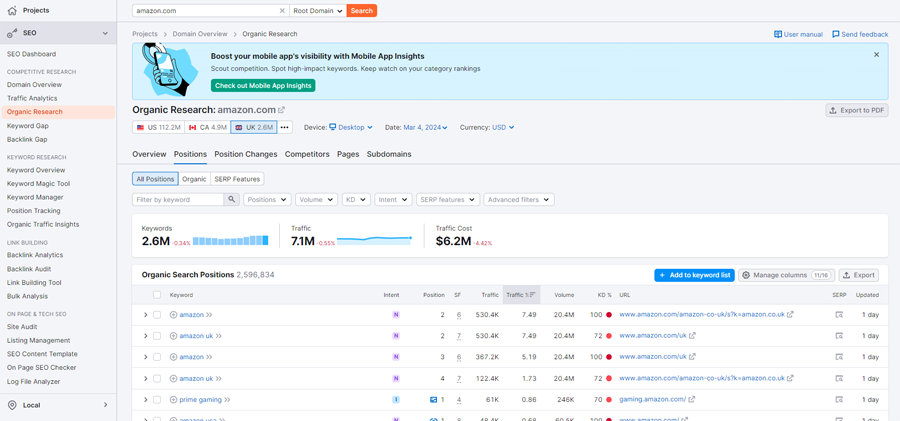Explore the complex world of Enterprise SEO with our detailed guide, which delves into both fundamental principles and advanced tactics. Gain expert insights designed to navigate the unique challenges and opportunities encountered by large corporations.
What Is Enterprise SEO?
Enterprise SEO, or Enterprise Search Engine Optimization, involves strategies and practices aimed at enhancing the online visibility of major companies or organizations. Unlike traditional SEO, which typically focuses on smaller websites or local businesses, enterprise SEO addresses the complexity of managing SEO for larger enterprises that may span multiple websites, divisions, and diverse audiences.
Essentially, Enterprise SEO concentrates on improving the visibility and performance of large-scale websites with numerous pages and intricate structures, typical of established firms and organizations. It’s characterized by its focus on scale, regardless of the business size; it’s the extensive web presence that counts. An exemplary enterprise in this regard is Amazon, which holds the top position in search results for over 847,300 terms in the US.

This scale exemplifies what we face when considering Enterprise SEO. Mastering this scale effectively promises exciting growth opportunities ahead.
Enterprise SEO demands a level of expertise proportional to its scale, presenting significant growth opportunities. Comparing its performance with Paid Media, it becomes evident that organic leads typically have a higher conversion rate and lower acquisition cost, highlighting the strategic value of Enterprise SEO.
Difference Between Enterprise SEO And Traditional SEO
While ‘Enterprise SEO’ and ‘Traditional SEO’ are terms often used to differentiate SEO tactics between large corporations and smaller businesses or startups, their meanings can vary.
Let’s break down the differences between these two approaches:
Scope and Scale
Enterprise SEO involves managing the SEO activities of large, international corporations or well-established organizations with expansive web presence. This includes overseeing numerous web pages, complex website architectures, and engaging with various stakeholders.
Conversely, traditional SEO is geared towards smaller businesses, startups, or organizations with a smaller online footprint. This generally involves managing fewer web pages and simpler website structures.
Resource and Budget
Enterprise SEO demands substantial financial and resource investment from large corporations. These companies typically allocate significant budgets to recruit specialized SEO teams and invest in advanced techniques and technologies.
Conversely, traditional SEO is typically more budget-conscious, catering to the needs of small and medium-sized businesses. These firms often employ a blend of in-house and outsourced efforts to manage their SEO strategies, balancing quality with resource constraints.
Team Structure
In Enterprise SEO, a specialized team is essential. This team, often comprising SEO experts, content creators, developers, and analysts, is pivotal in managing and coordinating SEO efforts across various departments and regions within the organization.
Traditional SEO, in contrast, usually involves smaller teams or individuals juggling multiple roles. Smaller businesses might rely on SEO agencies or freelancers to cover various aspects of their SEO strategy, a practical approach to achieve comprehensive SEO coverage with limited internal resources.
Technology and Tools
Enterprise SEO employs advanced tools and technologies designed for large-scale operations, focusing on extensive analytics, tracking, and optimization. These sophisticated tools are tailored to meet the unique demands of enterprise-level SEO, often complemented by customized solutions for specific challenges.
Traditional SEO, on the other hand, generally uses a more basic set of tools suitable for smaller online presences, prioritizing affordability and simplicity to align with smaller digital footprints.
Strategy and Approach
Enterprise SEO requires a holistic strategy that aligns with broad company objectives, brand reputation, and a variety of online platforms. It often includes international SEO tactics and relies heavily on analytics for optimization.
In contrast, traditional SEO targets more specific or niche audiences with a simpler and more direct strategy. The focus is on enhancing visibility in particular geographic locations or market segments, aiming to reach a smaller but more targeted audience.
Also Read: The Three Pillars of Search Engine Optimization
Advantages of Enterprise SEO
A pivotal success metric in Enterprise SEO is ‘Share of Voice (SOV).’ In SEO, SOV is used to measure a brand’s visibility in search engine results relative to its competitors, offering a holistic view of your brand’s market presence compared to others in the same industry or for specific keywords.
It’s important to shift focus from merely tracking keyword rankings to enhancing the Share of Voice. The SOV calculation is straightforward:
SOV = (Search volume your brand appears for / Total Search Volume) x 100
Why is increasing Share of Voice crucial?
Enterprise SEO presents an opportunity to influence an entire sector, significantly enhancing your company’s brand recognition and lead generation. Considering that about 81% of online traffic is derived from search engines, there’s a substantial opportunity for your brand to dominate specific market searches.
Let’s delve into how Enterprise SEO fosters business growth:
Growth in Website Traffic
Enterprise SEO involves optimizing a multitude of web pages. Achieving high search result rankings for these pages leads to a significant increase in organic traffic. The goal is to finely tune numerous pages with effective SEO tactics. The result is a noticeable increase in website traffic, a direct consequence of this detailed optimization effort.
Revenue Growth
Enterprise SEO strategically attracts potential customers genuinely interested in your offerings.
For instance, increasing your Share of Voice in the top 5 search results for transaction-intent keywords does more than boost visibility. It has a direct impact on your company’s financial performance, establishing a clear link between SEO efforts and revenue. By positioning your brand effectively in relevant search results, you engage potential customers who are more likely to convert.
More Authority
In Enterprise SEO, developing thought leadership for brands requires a sophisticated content marketing strategy. When executed effectively, this approach can lead to significant and transformative results.
Additionally, Enterprise SEO plays a crucial role in building and maintaining your online reputation, greatly influencing brand management. By integrating these elements, brands can establish themselves as thought leaders and strengthen their online presence, setting the stage for lasting success.
The combination of strategic content marketing and Enterprise SEO forms the foundation of a brand’s powerful digital footprint, enhancing credibility and ensuring long-term success.
Better User Experience
A Google survey revealed that over half of mobile users abandon websites that take more than 3 seconds to load, highlighting the importance of fast load times in providing a superior user experience. This is a key component of technical Enterprise SEO.
Improving technical aspects of your web pages should focus on Core Web Vitals. This minimizes issues like slow page speed, redirection errors, or 4XX errors, with the overarching goal of delivering an enhanced customer experience.
Competitive Advantage
A well-implemented Enterprise SEO strategy can offer a significant competitive edge by surpassing competitors in search results. This advantage arises from increased visibility and a strong online presence, contributing to the establishment of your brand’s authority in the industry.
An effective strategy not only improves a brand’s online visibility but also strategically positions it ahead of its competitors. The enhanced exposure gained from higher search rankings is key in reinforcing the brand’s trust and influence within its target market. This highlights the vital role that smart SEO plays in developing a strong and authoritative brand image.
Brand Credibility and Trust
Websites ranking higher in search results are generally perceived as more credible by users. Investing in Enterprise SEO helps in establishing a strong online presence, which in turn boosts the trust and authority of your brand. This increased visibility not only attracts a larger audience but also instills user confidence, positioning your business as a reputable and trustworthy player in the digital world.
Global Reach and International Expansion
For businesses aiming to connect with a global audience, implementing international SEO strategies is crucial. Tailoring content to different languages and cultures allows companies to optimize their online presence for global accessibility. This approach is especially beneficial for enterprises that are already operating worldwide or those planning to expand their international reach.
Data-Driven Decision-making
Enterprise SEO analytics provide critical insights into user behavior, preferences, and trends. Utilizing this data empowers brands to refine their strategies, efficiently allocate resources, and optimize for enhanced outcomes. Adopting a data-driven approach to decision-making leads to more effective management and continual improvement, equipping organizations to thrive in the ever-evolving world of digital marketing.
Adaptability to Market Changes
Staying updated with SEO performance and industry trends is vital for businesses to quickly adapt to changes in the online landscape. This agility is key to maintaining a competitive advantage and securing a strong online presence. By consistently monitoring and responding to the digital environment, businesses can effectively adjust to market shifts, ensuring sustained relevance and online visibility.
Enhanced Local Presence
Incorporating local SEO into your broader enterprise SEO strategy is crucial, especially for businesses looking to connect with local audiences, particularly those with physical locations. This approach improves visibility in local search results, leading to increased foot traffic and more meaningful interactions with local customers. Tailoring optimization for local impact is a strategic move to reinforce your brand’s presence and strengthen community ties.
Improved Cross-Channel Marketing
Integrating SEO with other marketing channels, like social media and email, creates a synergistic effect that amplifies your overall marketing impact. Consistency across these channels not only solidifies your brand message but also boosts brand recall. This strategic integration ensures a unified and compelling presence, enhancing the effectiveness of each channel and resulting in a more impactful, memorable marketing campaign.
Effective Strategies for Enterprise SEO

Source: Pinterest
Enterprise SEO, while sharing some commonalities with traditional SEO, has unique aspects that distinguish it. For large websites, implementing enterprise SEO involves prioritizing key strategies:
Site Structure and Architecture
Large websites typically feature complex structures with many pages and subdomains. It’s vital to maintain a clear, logical site structure to ensure effective crawling and indexing by search engines. Given the complexity, meticulous attention is needed to ensure flawless interpretation and indexing. A well-organized site architecture is pivotal for enhancing search engine visibility and overall website performance.
Keyword Strategy
Developing a successful keyword strategy involves identifying relevant keywords across different website sections. It’s about aligning content with user search intent, which includes not only pinpointing keywords but also crafting content that resonates with those searches. Consider incorporating long-tail keywords related to specific products, services, or locations.
Assigning specific keywords to particular pages on your website is essential. This focused approach ensures each page targets a distinct set of keywords, optimizing the overall effectiveness of your SEO efforts. Such tailored optimization not only boosts content visibility and relevance but also improves user experience, increasing the likelihood of attracting your target audience.
On-Page Optimization
Optimize meta titles, descriptions, header tags, and URL structures on every page. Produce high-quality content that is valuable to both users and search engines. Use descriptive, keyword-rich alt tags for images. This comprehensive on-page strategy boosts your website’s visibility and user experience, thereby enhancing its performance in search engine rankings. Consistent optimization of these elements is key to maintaining online success.
Content Optimization
Effective search engine performance requires creating high-quality, relevant, and engaging content. This includes optimizing product pages, blog posts, and essays for search engines, focusing on keyword usage, readability, and multimedia integration.
The goal is to produce content that meets user intent and offers real value. Maintaining a regular content schedule ensures consistent updates, keeping your audience engaged and informed. Regularly updating and revising existing content also helps to keep your online presence fresh and impactful.
Technical SEO
Continually assess and improve the technical aspects of your website, including site performance, mobile compatibility, and crawlability. Address duplicate content issues with proper URL structures and canonical tags. Creating and submitting an XML sitemap to search engines is also crucial.
This approach falls under technical SEO, aiming to remove barriers for search engines to access and index your site. Proactive technical optimization enhances user experience and increases your website’s visibility on search engine results pages.
Backlink Strategy
Developing a strong backlink profile is essential for SEO success. Utilize outreach, partnerships, and various tactics to acquire high-quality backlinks. Regularly managing and monitoring your backlinks ensures a robust link profile, which is critical to the effectiveness of your SEO strategies.
User Experience (UX) Optimization
Optimize the user experience for desktop and mobile devices. Improve website navigation and ensure clear calls to action on each page. Aim to reduce bounce rates by providing a seamless and engaging user journey, potentially involving a complete redesign of website design and functionality for an optimal browsing experience.
Social Media Integration
Integrating social media into your enterprise SEO strategy expands your content’s reach and establishes brand authority. Foster active social sharing and engagement to enhance your online presence. Aligning SEO efforts with social media activities boosts content visibility and strengthens your brand’s digital influence. This collaboration not only extends the reach of your content but also reinforces your brand’s credibility across platforms.
Local SEO
For businesses with physical locations, robust local search optimization is essential. This involves managing company listings consistently, responding to consumer feedback promptly, and maintaining uniformity in NAP (Name, Address, Phone Number) details across various online platforms. This strategy boosts the business’s online presence and nurtures customer trust, fostering sustainable growth through aligned and accurate information across digital channels.
Also Read: Local SEO vs National SEO: Which one to Choose?
Analytics and Reporting
Analytics tools are pivotal in monitoring and evaluating the effectiveness of SEO strategies. Advanced analytics solutions provide businesses with insights into user behavior, conversion rates, and other critical metrics. These tools enable companies to thoroughly assess the impact of their SEO efforts, guiding informed decision-making and strategy adjustments for enhanced results.
Security and Compliance
Website security and compliance with search engine guidelines are paramount for large enterprises. This includes implementing secure protocols like HTTPS, addressing content duplication issues, and keeping abreast of algorithm changes. These measures bolster internet security and search engine visibility. Maintaining these standards secures a strong online presence and aligns with evolving digital norms.
International SEO
International SEO is a key focus for brands operating in multiple countries. It involves optimizing content for different languages and regions, utilizing elements like hreflang tags, country-specific domain structures, and strategic geotargeting. These components collectively elevate a brand’s global online presence, ensuring a tailored and effective approach for international audiences.
Team Collaboration
Successful enterprise SEO hinges on effective collaboration among diverse teams, including marketing, IT, content creation, and site development. The key to successful implementation is strong communication and coordination across these teams. This collaboration ensures a unified strategy that aligns with the enterprise’s overall goals. Harmonized efforts across departments are essential for optimizing SEO strategies and achieving impactful results.
Enterprise SEO Challenges
We’ve emphasized the importance of effectively executing enterprise SEO in our discussions, highlighting the inherent obstacles it presents. At the core of these challenges lies a central theme: scale.
Dealing with SEO on an enterprise level poses a considerable challenge due to the extensive number of pages and intricate site design. To successfully implement SEO strategies at this scale, a substantial team consisting of SEO professionals, content marketers, and domain specialists is essential.
Now, let’s delve deeper into these challenges:
Legacy Systems
Many business websites still rely on outdated technologies that fail to meet current SEO standards. This poses a significant challenge when aiming to implement effective SEO strategies.
Hence, it is crucial to prioritize the modernization of these outdated systems, particularly those that do not directly enhance operational efficiency. This step is essential to make your extensive website more SEO-friendly. By replacing these obsolete technologies, you create a conducive environment for seamlessly integrating SEO best practices, thereby enhancing your site’s overall visibility and performance in search engine results.
Legal Issues
Large-scale content creation is critical for corporate SEO. It’s not only about the quantity; keeping high-quality content is also important, especially for well-known businesses. Negligent coaching and unregulated promotions might lead to legal issues. To avoid such complications, it is critical to be alert and ensure that the material adheres to legal norms.
Content Decay
Enterprise SEO teams often encounter a significant challenge: maintaining the relevance and freshness of their content. The issue of content decay is particularly prominent, especially for corporate websites, where interest in specific topics may wane over time, or information may become outdated.
The necessity for conducting regular content gap analyses becomes more apparent as the number of pages on these websites increases. It is a crucial step in identifying gaps in your content and determining whether it requires refreshing or updating. In essence, as your collection of content expands, proactively evaluating content relevance becomes imperative to sustaining a website that effectively caters to its audience.
Managing the Workflow
Ensuring a smooth and obstacle-free implementation of an efficient Enterprise SEO strategy is crucial. The workflow needs to be meticulously structured, with clear and logical processes for teams.
This involves clearly assigning tasks, coordinating events, and closely monitoring milestones. Additionally, the strategy should incorporate technologies that aid in analyzing campaign performance. Assessing stakeholder engagement throughout the process is essential. This comprehensive approach is vital for enhancing the company’s SEO strategy.
Siloed Teams
Coordinating and maintaining uniformity among numerous teams and departments responsible for overseeing different aspects of the website can pose a challenge. It’s crucial to establish connections among these diverse teams to facilitate collaborative efforts toward a shared objective. This interconnected approach fosters enhanced collaboration, streamlines endeavors, and ultimately enhances the overall effectiveness of the website administration process.
Teams can enhance coordination, share ideas, and synchronize their efforts by promoting communication and breaking down silos, leading to a more efficient and cohesive operation. This proactive strategy is essential for achieving desired outcomes and boosting the collective capacity of all website management teams.
Competition
Smaller, more specialized websites tend to focus on specific, longer-tail keywords. While these keywords might not have the highest search volume or present the most difficulty, they are strategically chosen to target a particular demographic. In contrast, enterprises set their sights on loftier goals, aspiring to establish dominance within their sector. To achieve this, they focus on terms with both high search volume and a greater level of difficulty.
Successfully navigating the complexities of highly competitive marketplaces now requires more than a surface-level understanding. To stand a chance, you must delve deep into the competitive landscape.
The game plan for each category of terms you aim to dominate is straightforward: secure a substantial Share of Voice in the first 3 or 5 search results. Achieving this necessitates an Enterprise SEO plan tailored to strike the right balance with keywords. It’s not just about selecting the appropriate keywords; a robust content development plan is equally essential.
Technical Errors on the Website
Both smaller websites and enterprise websites encounter technical issues, such as slow page load speeds and broken links. The difference lies in scale. With a large number of web pages, enterprise websites face a more challenging task in monitoring 4XX errors and resolving 301 redirect issues.
It is crucial to note that these technical issues can lead to a significant loss of inbound traffic. Furthermore, corporate websites are more prone to duplicate content, orphan pages, and thin content.
Addressing these issues is vital for maintaining optimal website performance and preventing potential visitors from slipping through the cracks. It’s a challenging task that requires precise attention to detail and a comprehensive approach to site administration. Failing to address these issues directly can have long-term consequences for the overall effectiveness and user experience of your website.
Undefined Success Metrics
Understanding the effectiveness of SEO in enterprise settings presents a challenge due to the delayed visibility of results. To address this, it’s crucial to adopt a thorough and data-centric SEO strategy, which involves monitoring critical success metrics such as Share of Voice, Leads, and Conversions.
Enterprise businesses can improve their search engine presence, increase traffic, and stimulate business growth by confronting these challenges directly. However, achieving this necessitates a meticulously coordinated and strategic approach. It’s not merely about overcoming obstacles; it’s about implementing a well-thought-out plan to ensure success in the competitive landscape of online visibility and customer engagement.
Best Practices for Enterprise SEO
We’ve explored various challenges within enterprise SEO, and addressing these obstacles is crucial. Failing to overcome these challenges could lead to subpar outcomes for your strategy.
Establish Proper Benchmarks
To enhance the effectiveness of enterprise SEO, it is crucial to establish reliable benchmarks through the development of robust processes. This involves assembling a team of SEO professionals well-versed in navigating the intricacies of overseeing large-scale SEO campaigns.
Moreover, the use of enterprise-grade tools, including proprietary ones, is indispensable for efficiently managing scale. These tools play a pivotal role in handling the complexities associated with SEO at the enterprise level.
Ultimately, it is imperative to define and implement adequate success measures. These indicators serve as a yardstick to assess the overall efficacy of the SEO strategy. Without such benchmarks, determining the impact and success of the adopted tactics becomes a challenging task.
Automate
Enterprise SEO can benefit significantly from automation, enhancing both precision and efficiency in execution.
Effectively managing the vast scale of Enterprise SEO activities is a critical area where automation proves invaluable. Consider rank tracking, for instance. In large enterprises, manually monitoring the ranks of each individual term becomes an impractical task. This is where automation, exemplified by solutions like Semrush, steps in to streamline the entire process.
The complexity intensifies in the realm of technological concerns. Manually checking every page for Schema Markup and 4XX faults is a daunting process. The solution lies in automation, particularly leveraging AI-enabled technologies. These technologies adeptly identify and uncover technical flaws, ensuring a comprehensive and methodical approach to problem-solving.
Use Dynamic Dashboards
Organizations must prioritize monitoring the effectiveness of their Enterprise SEO strategy, and employing dynamic dashboards can significantly contribute to achieving this goal.
Adding visual features to these dashboards is essential. Attempting to manually track rankings and traffic for multiple websites is both unrealistic and inefficient. Dashboard visual features play a critical role in clearly presenting key success metrics.
It is recommended to integrate data points from various sources, including Google Search Console, Semrush, Ahrefs, and other specialized platforms, into Google Looker Studio to create these analytical dashboards. The exceptional visual capabilities of Google Looker Studio ensure a comprehensive and accurate representation of the findings, enabling a more effective assessment of the Enterprise SEO strategy’s effectiveness.
Focus on Developing Topic Clusters
In a previous discussion, we emphasized the concept of Thought Leadership. Today, establishing Thought Leadership relies on cultivating Topical Authority, and one impactful approach to achieve this is by implementing Topic Clusters.
For larger enterprises, it’s imperative to avoid creating content in isolated silos. Smartly mapping out keywords and ensuring their alignment with a hub-and-spoke scheme is crucial. This method enables the effective utilization of these phrases when crafting content. By implementing a comprehensive plan like this, companies can position themselves more effectively as thought leaders in their respective sectors.
Conclusion
In conclusion, Enterprise SEO emerges as a crucial approach for navigating the ever-changing landscape of digital marketing, where the integration of AI, machine learning, and deep learning technologies is increasingly vital. This comprehensive post delves into the intricacies of Enterprise SEO, providing methods and advice tailored for large-scale enterprises.
In a rapidly evolving digital environment, where Google’s algorithm undergoes tweaks and new platforms like ChatGPT shape the future of SEO, businesses must not only adapt but also innovate. In an era where digital technologies are essential for marketing success, the incorporation of AI-enabled solutions within enterprise SEO not only enhances exposure, organic traffic, and brand reputation but also empowers businesses to thrive.
Remaining relevant in an ever-changing world requires a proactive strategy that integrates the ideas mentioned in this book to engage with target audiences and achieve long-term success in the competitive online ecosystem. As AI and other technologies continue to impact the future of marketing, Enterprise SEO remains a critical component for organizations aiming to efficiently expand and enhance their marketing operations.
FAQs
How can large enterprises overcome common challenges in implementing SEO?
To overcome typical challenges in Enterprise SEO, it’s crucial to foster effective communication and collaboration across various departments. This includes the implementation of scalable SEO processes, staying updated on search engine algorithm changes, and harnessing advanced SEO tools and technologies.
What role does content play in Enterprise SEO?
Content plays a pivotal role in Enterprise SEO. The creation of high-quality, relevant, and optimized content is instrumental in enhancing search engine rankings, engaging the target audience, and contributing to a positive user experience. It is imperative that the content strategy seamlessly aligns with SEO goals and user intent.
How can large enterprises ensure mobile optimization for SEO?
Large enterprises can ensure mobile optimization by adopting responsive design, optimizing page speed, prioritizing the mobile user experience, and incorporating mobile-friendly structured data. Given the increasing use of smartphones for online searches, mobile optimization is a crucial aspect of SEO strategy.
How can enterprises measure the success of their SEO efforts?
Enterprises can measure the success of their SEO efforts through key performance indicators (KPIs) such as organic traffic growth, keyword rankings, conversion rates, and revenue generated from organic search. Consistent monitoring and the use of analytics tools are essential for tracking and evaluating SEO performance.


























 RSS Feeds
RSS Feeds